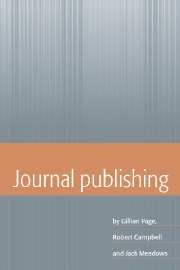Book contents
- Frontmatter
- Contents
- List of figures
- List of tables
- Preface
- 1 Introduction to journals
- 2 Editing
- 3 Production
- 4 Marketing
- 5 Subscription management and distribution
- 6 Non-subscription revenue
- 7 Legal and ethical aspects
- 8 Financial aspects
- 9 Bibliographic aspects
- 10 Managing a list of journals
- 11 Electronic publishing
- Appendix 1 Getting tenders for journals
- Appendix 2 Publishers' and editors' associations
- Glossary
- Bibliography
- Index
7 - Legal and ethical aspects
Published online by Cambridge University Press: 23 October 2009
- Frontmatter
- Contents
- List of figures
- List of tables
- Preface
- 1 Introduction to journals
- 2 Editing
- 3 Production
- 4 Marketing
- 5 Subscription management and distribution
- 6 Non-subscription revenue
- 7 Legal and ethical aspects
- 8 Financial aspects
- 9 Bibliographic aspects
- 10 Managing a list of journals
- 11 Electronic publishing
- Appendix 1 Getting tenders for journals
- Appendix 2 Publishers' and editors' associations
- Glossary
- Bibliography
- Index
Summary
Copyright
The purpose of copyright legislation is, on the one hand, to reward the author and the publisher (the originator and the financier/distributor) for their efforts and to fund further creativity, whilst, on the other, to allow access to their published material. Until recently, such legislation was designed to deal primarily with printed material. The development of photocopying technology already presented it with problems, and the effects of the computer-based information revolution of the last few years have been to leave some copyright legislation lagging far behind. The USA was one of the first countries to recognise the need for new legislation. Unfortunately, its copyright act of 1978 was introduced before the full implications of information technology had been recognised. The Copyright, Designs and Patents Act of 1988 in the UK is more satisfactory in this respect, and gives a fair indication of the way in which current thinking on copyright is going. Two general introductions to copyright worth consulting are Strong (1993) and Cavendish and Pool (1993). The former is particularly concerned with the USA, and the latter with the UK. Learned Publishing produces a regular column on copyright which is useful for keeping up to date; see, for example, a review by St. Aubyn (1995).
International agreements
The oldest international copyright agreement, the Berne Convention (the International Convention for the Protection of Literary and Artistic Works), was concluded in 1886.
- Type
- Chapter
- Information
- Journal Publishing , pp. 240 - 269Publisher: Cambridge University PressPrint publication year: 1997



